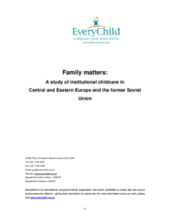The authors demonstrate that the overuse of institutional care is far more widespread than official statistics suggest; it remains a very serious problem, with damaging effects on children’s development. Many attempts at reform have been well meaning but misguided, and there is a serious danger that many view the overthrow of the communist system as sufficient evidence of reform in the region. These problems have far-reaching consequences: each generation of damaged children is likely to turn into a generation of damaged adults, perpetuating the problems far into the future.
Although most of the evidence in this report is based on Central and Eastern Europe and the former Soviet Union, it is very important to stress that the problem of children in large residential institutions is not confined to that region. The escalating growth in HIV/AIDS in recent years, as well as the many ongoing violent conflicts in the world, has meant that there are many more children in the world without parents. For example, it is calculated that Ethiopia alone had an estimated 989,000 children orphaned by AIDS in 2001, a figure which will have increased to over two million by 2010 (UNICEF 2003). With such numbers, it is hardly surprising that governments cannot cope, and are susceptible to suggestions that orphanages are the answer. If there is only one lesson to be drawn from this report, it is that the rest of the world must learn from the mistakes made in CEE and FSU, and avoid creating more large-scale orphanages.
The shorter, comms-friendly version of the report is available here.

